Music festivals are more than just concerts — they’re entire worlds where fans lose themselves in the sound, the energy, and the moment. But what happens when an artist doesn’t just play festivals, but makes music that feels like one? With his latest album Festival Season, SAINt JHN delivers an electrifying experience that blurs the line between live spectacle and studio magic.
Led by high-energy singles like “Glitching” and the genre-bending “Poppin,” Festival Season arrived on Friday (Feb. 21) as JHN’s most ambitious project yet. The album fuses elements of house, hip-hop, punk and electronic music, capturing the thrill of a headlining set and the intimacy of a late-night afterparty. Inspired by the euphoric highs and unpredictable chaos of real-life festivals, SAINt set out to craft a project that feels just as immersive as the events that shaped it.
“Festivals are like a different universe,” he tells Billboard just a day before the album’s release. “I wanted to make something that sounds like you’re in the middle of one – something that makes you want to move, scream, and lose yourself in the moment.”
After making waves with While The World Was Burning, SAINt JHN has spent the last few years pushing his sound to new heights. Whether performing on massive stages or collaborating with some of the most forward-thinking artists in music, he’s built a reputation for tearing down genre boundaries and delivering electrifying music. Now, with Festival Season, he’s bringing that same energy straight to the speakers.
Billboard caught up with SAINt JHN to discuss Festival Season, his genre-blurring sound, the electrifying energy of live performances, and how he’s elevating the festival experience on his own terms.
Festival Season is your first full project in four years. What inspired the album’s title, and what’s the overarching theme you want listeners to take away?
The reason why it’s called Festival Season is because it sounds like you’re at a live SAINt JHN concert.
And if you’ve ever heard any of my music – and even if you haven’t – I’m genre divergent. I’m a bit disrespectful when it comes to genres. I don’t really play to any one particular sport. I just like what I like. I like the sounds of music. So when you hear this collection from top to bottom, from tip to toe, it sounds like you’re in the middle of a festival, and you’re running from stage to stage to hear your favorite artist.
It’s all just me. But the songs change, and the theme changes, and the mood changes. But if you’ve never been to a performance, this sounds like a pocket performance. You can hear crowd interaction, chants. You’re hearing yelling. You’re hearing fans screaming my name.
Because that’s what it’s like to be at a SAINt JHN show. It’s an enormous concert. The mood changes, the theme changes, the sound changes, but the energy never dies. So Festival Season was born from that. I wanted the people who might have been on the other side of the planet, in a place that I’d never been and never visited, to be able to take home a pocket performance from me.
It’s a world where I perform on a stage in front of you. But you get to see some of the things I go through—the emotions, pains, the curiosities, the uncertainties, the doubts—but everything is at a maximum level. Nothing is low. The decibel is on 10-plus the entire time.
With so many different sounds on this project — Afro-fusion, alternative pop, introspective moments — what song do you think will be the breakout hit, and why?
I feel like it’d be a stupid response of mine to tell you what I think would be the breakout hit. I don’t know. I’ve never known what people want. I don’t know what people want from me. I don’t know what people want for themselves. I know the way art works in the best format and the best possible thing is you make the thing that you love, and then people decide from that what they love.
It’s like – I was going to say something stupid, like the guy who probably invented the cheeseburger was probably just trying to make a milkshake, and the cheeseburger came out of it, and they were like, “We like that.” So I think maybe some of that will happen. I do have a creeping suspicion. I got a song I think is gonna go crazy.
I think a bunch of them are gonna go crazy. Well, I think for “The Gangsters,” it’s gonna be sort of undeniable, especially when you hear it live—like, when you really see it presented, I think it’d be hard to deny that. But I don’t got no predictions. I don’t want to be the guy at the Super Bowl going, “Yo, this is the team.”
When fans press play on this album, how do you want them to feel? What emotions or experiences do you hope to evoke?
I hope when people listen to this collection, I hope they feel bolder than they’ve ever felt. There’s a feeling that you get when you leave a concert, when you leave a festival.
There’s a certain type of energy that you get to take home with you that doesn’t last a long time. For some people, it lasts a couple of days, for some people maybe a couple of weeks, and for some people, it just lasts moments after it. There’s a heightened endorphin, a certain surge of energy, and I want people to get that.
But I want you to be able to press play again and do it again. Usually, you have to venture back to the performance, into a field where you wore an outfit, where you brought a date, where you spent the money on the tickets. Usually, you have to go hunt the thing that you’re looking for. I wanted you to be able to take it home with you so you could restart it every time you felt something that you needed.
Every album has an ideal setting for full immersion. Where do you think Festival Season is best experienced? Is it a car ride, a morning commute, a late-night listen?
I think the best place for you to immerse yourself, to hear this, to experience this, is at a tiny rave. That tiny rave could happen in so many different places, right? But your mindset needs to be a “tiny rave.”
It could happen in your bedroom, but you gotta be ready to ruffle up the bedsheets. It could happen in your living room, but you’re gonna have to be ready to spill some coffee, spill some champagne. It could happen in a car ride, but maybe it’d be hard to focus on driving.
It’s an immersive experience, and in order for you to take it in, you gotta be willing to submit to it. This isn’t like a vending machine where you say, “I want Coca-Cola and Sprite.” This isn’t that.
This is — show up. I’m gonna make you something really special. This is omakase. This is when you show up, and the chef says, “I’m going to make you something. It’s going to be exceptional. Don’t make any requests. Just be hungry when you get here and be appreciative when you leave here.”
This album also marks a big moment for you—your signing with Roc Nation Distribution. How does this partnership elevate your vision for the next phase of your career?
I think it’s just more freedom. My entire career, my entire purpose in life — the only things I’m looking forward to and the things that I’m hunting, the thing that drives me in the morning and keeps me up at night – is this type of unbridled freedom that only creatives who reach their maximum peak get to feel.
That’s what I look to feel every day. So to be in partnership with people who share a similar vision, who’ve been disruptive from the beginning of their historic run, it just means I’m in league with the right people. I’m just on the right team.
You’ve always pushed boundaries sonically, but Festival Season feels like an expansion of your artistry. How do you think this album reflects your growth since While the World Was Burning?
I always tell a tale from where I’m at at the time. While the World Was Burning, the world was on fire.
Collection one was my first collection. So you get to hear the presentation. You get to see exactly where I’m at. I’m centered in the middle of my universe, but I’m telling a story from the seat of the couch, wherever the couch is positioned. Festival Season – you can tell I’m going back on the road. I’m living in my purpose.I’m in my path. My garden has become the stage, and I just want to introduce you to what I’ve been harvesting.
You can hear the maturation in my language. You can hear the maturation in my tone. You can tell I’m not in the same place you left me at, and I think that’s the purpose. That’s an artist’s purpose—to continue growing and evolving.To find new paths. To find new places to venture. To find scarier formats. To find things that are unexplored. It doesn’t seem like I’m tracing myself.
What tends to happen is, when an artist becomes successful, people want them to run the same route—like, “Keep this. Do it again. Do that same lap again. Do it again so I can see it. I didn’t get to see it the way you started the race. Alright, run it again. Alright, cool, cool. We saw it twice. Now do it three times.” But that’s not what artistry is. That’s not what creativity is. Creativity is complex. Creativity wants to continue creating. Creativity designs itself to continue finding new places.
So to be an ultimate, consummate creative, you have to be willing to break through your own glass box that you’ve built. You have to be willing to run the lap backwards, sideways, on your hands. That’s what I’m doing. It might look like the same race, but I’m definitely not sprinting at the same pace.
You chose “Glitching” and “Circles” as your recent singles. Why did you choose those two?
“Circles” is from [my upcoming album] Fake Tears From a Pop Star, and as I was about to roll out Collection Two entirely, I was starting there because Fake Tears From a Pop Star was going to lead.
But I made a pivot. And I think that’s really incredible – when an artist can actually change paths, change course mid-move. I feel like Michael Jordan in the air, about to go for a dunk and turning it into a layup because I saw the block coming. I saw the contender coming, and I was like, “Nope, watch this.”
And the point – the reason why I did that – was because I thought people weren’t ready for it. That’s the truth. “Circles,” for me, is an incredible song. It’s almost like indie rock meets whatever I am naturally. And without me intending to make indie rock music – I’m just doing whatever I feel. I’m just letting my freedom find its own path. But as I was doing that, I was like, “Ah, this isn’t the right timing.”
And I felt this way before. Because I remember how I felt on Collection One, and I trust my own instincts. If you get there before the audience gets there – if you get there long before they get there – your wait to build a foundation is going to be really aggressive. I’d rather build right as they’re showing up.
So I pushed Fake Tears From a Pop Star back a couple months so that I could get the full expression of what needs to happen. As I’m coming back out, running out the gate four years later, I want it to be disruptive. I don’t want it to be harmonious. I don’t want it to be pretty pastels. I want aggressive colors. I want rage. I want dysfunction.
Because I think we need that. I think in the time that we’re in, simple harmony gets overlooked and misunderstood. So we need to fight before we kiss. So that’s why “Circles” led, and that’s why “Glitching” followed “Circles.” Because when I pivoted from Fake Tears, moving on to Festival Season, there was an energy I was looking for. A certain, unfamiliar, progressive energy.
And the strange thing is, my core audience – the people who have been following and loving SAINt JHN since 2018, 2016, 2017 – they want to hear super melodic music. They don’t actually want to hear things that make them dance. The tempo is strange to them. “Glitching” is strange to them. It’s progress that they don’t want. But I know I have to get there before they arrive — because that’s my job.
You’re heading on your Festival Season North American tour next month, and you’re also hitting Coachella. What’s your vision for the live show experience this time around?
Tough question, because I don’t know what my Coachella set is going to be. I don’t know what the stage design is yet. I’m having a thousand conversations. This is my first time really, really collaborating with any degree of people – just considering how else I can see myself.
It almost feels like Alexander McQueen, shifting from creative direction by him – it’s his brand – and someone else stepping in to execute his vision, but with their taste. So I’m considering that. I’m looking at my world in a completely new way. I want to see what somebody else’s perspective on me is.
So I’m entertaining new conversations. I don’t have a complete vision for what that’s going to look like. Because I’ve always satisfied myself on the road by telling my truth. It’s always been loud. But the way I want to present my story now – I’d like it to be theatrical. That’s the truth. I want you to feel a sense of theater with the same sense of journey, passion, commitment, and pride.
Beyond music, you’ve been making moves in fashion with your new clothing line Christian Sex Club and appearing at major fashion weeks. How does your personal style influence your artistry, and vice versa?
I think it’s just another language for me. Style is just language. Sound is just language. Like when you hear a Trinidadian accent, it’s just the melody of the accent that separates it from a Guyanese accent. So style, for me, is just another type of melody.
It’s a visual melody. When the denim hits the leather, and the leather hits the silk, or the fur hits the canvas, and the canvas hits the viscose. By the way, I hate viscose. They inform each other because I get to live in the world that I create.
Like when you see a movie, and you’re listening to the audio from it, you can see the theatrics of it, and you hear the script and the character development. But what really tells you and informs you how to feel is what they look like and what the wardrobe is. So it gives you a different color and dimension.
It’s just another part of it – another part of storytelling for me, another part of the language. Another way to be more dialed in.
You also made your acting debut in The Book of Clarence last year. What was that experience like, and do you see yourself exploring more roles in the future?
Yeah, I’m gonna be doing a lot more acting. I always thought I would. You know what’s funny? I thought I preferred to be behind the camera – and I probably do. But the people who care enough about me are like, “Yo, shut up. Don’t be stupid. Stand in front of the camera. Do the thing that you do incredibly well.”
James Samuels – he is my brother – he directed The Book of Clarence, wrote it, scored it. He did everything you possibly could do. And I’m like, “Yo, I think I want to direct.” He’s like, “Bro, your magic don’t hide.”
So I won’t hide. I intend on doing a lot less hiding. So you’ll see me in more cinematic presentations, even though I just prefer to be the guy that coordinates. Because I think the people who don’t want to be seen, who aren’t looking for attention, can really do their art and execute it at a maximum level. And I think the people who want to dance in front of the lights end up being just performative. And I never wanted to be performative. I really wanted to do the thing I cared about because I really cared about it.
But with all that bulls—t being said – yeah, you are gonna see a lot more acting from me, because it seems to be something that comes naturally to me.
With Festival Season setting the tone for this next chapter, where do you see yourself creatively and personally in the next few years?
Oh, I can see the next 18 months really, really clearly – without giving away anything, My life works best, and my art works best, when I can see 24 months, 36 months – when I can clearly see my vision for the future. And over the course of the last four years, I’ve been building. The next iteration of it is this year.
I really want to put out three collections. That’s the truth. So I’ve been working on the third collection, because Fake Tears from a Pop Star is done. I won’t give away the name of the third collection, but I’m really excited about it – just as excited as I am for Festival Season. And if I can see the third collection this year, that means I can see the first quarter of next year and what touring next summer looks like.
And that gives me an immense amount of clarity. That means I know where I need to be. I feel overconfident that I’m where I need to be. I’m in lockstep.


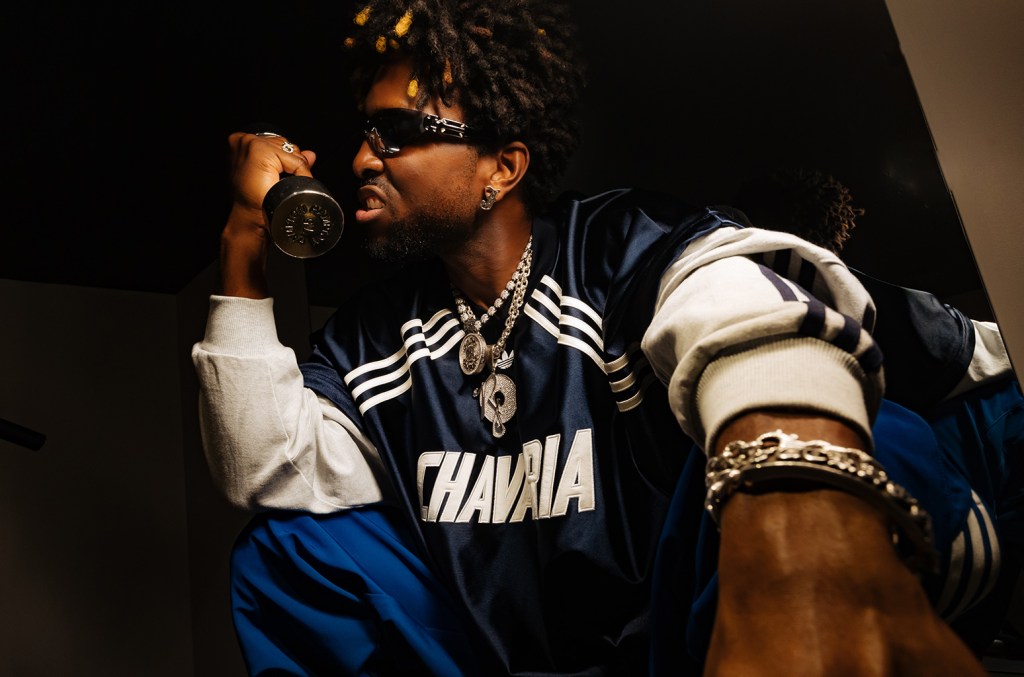

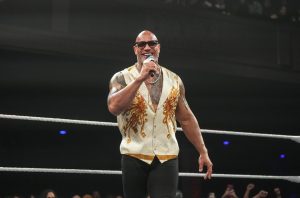
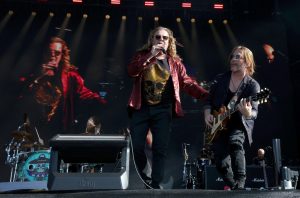
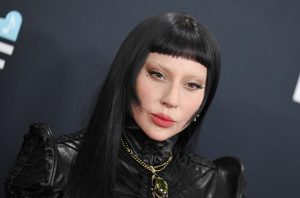
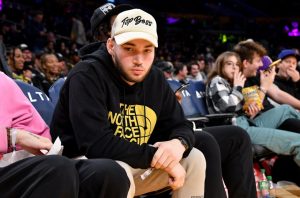
Comentarios